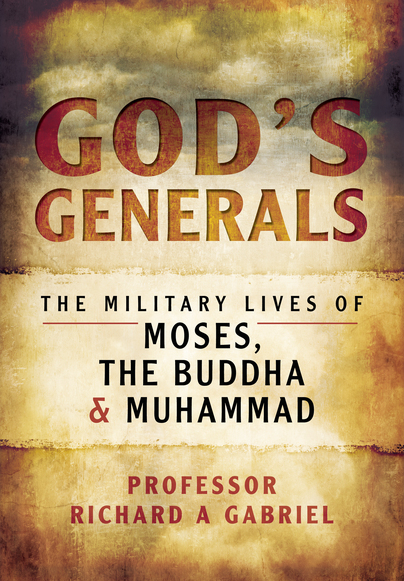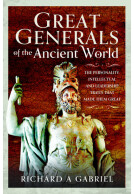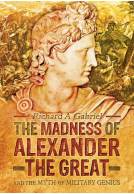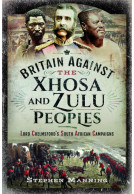God's Generals (Hardback)
The Military Lives of Moses, the Buddha and Muhammad
Imprint: Pen & Sword Military
Pages: 242
ISBN: 9781473859043
Published: 27th July 2016
(click here for international delivery rates)
Need a currency converter? Check XE.com for live rates
| Other formats available - Buy the Hardback and get the eBook for free! | Price |
|---|---|
| God's Generals ePub (3.4 MB) Add to Basket | £6.99 |
It is one of the more startling facts of military history that the founders of three of the four 'great religions'—Judaism, Buddhism, and Islam—were also accomplished field generals with extensive experience in commanding men in battle. One of these, Muhammad, fought eight battles and was wounded twice, once almost fatally. Another, Siddhartha Gautama (later to become the Buddha), witnessed so much battlefield carnage that he suffered a psychological collapse. Moses had become so much a 'god-intoxicated' personality, it is a reasonable suspicion that he, like the Buddha, was murdered. Indeed, had the experiences of these men in war not been so successful, it is quite possible that their achievements as religious leaders would never have occurred. For all three, war and religion were so closely intertwined in their personalities that it is difficult to discern where the influence of one ended and the other began. This book attempts to explore the military lives of Moses, the Buddha and Muhammad, and the role their war experiences played in their religious lives.
God`s Generals is an informative, well-written read.
UNRV
See the full review here.
A surprisingly interesting and readable book, for many readers it could be an introduction to a number of separate and otherwise unrelated areas.
Slingshot 308
Offers a comparative study of military life of
VaeVictis, November – December 2016
Moses, Buddha and Mohammed.
The central thesis of this book is that the founders of 3 of the world’s 4 major religions, Judaism, Buddhism and Islam, were military men.
Dr John Viggers, Freelance
The historical sources about Moses are the most indefinite of the three founders. Most of the information about Moses comes from the first books of the bible, but there are some very relevant archeological finds about ancient Egyptian monotheism. The author makes a case that the Israelites did not “escape” from Egypt, but that they were expelled. And that Moses, raised as an Egyptian prince, was an experienced general, who used his military skills very effectively in leading his people towards the “promised land”. Genocide was used by the Israelites (under divine instruction of course).
This is the old testament as written, but certainly not as taught at Sunday school.
The very interesting section on Siddhartha Gautama (Buddha), delves into the violent, and incessant warring in India of the period. The author makes a fairly strong argument that the founder of Buddhism suffered from post traumatic stress disorder, leading to the unique decision for an Indian prince of the time to become a pacifist. And for his philosophy to morph into a major religion.
Possibly of more significance to the present epoch, is the history of Muhammad, and the early years of Islam. The author leaves no doubt that “Jihad” meant holy war, and that killing non Muslims was divinely ordained. And that meaning is still what is understood by most of the world’s Muslims.
The final section of the book, is on the legacies of the wars fought by the monotheistic religion founders. The conclusion, that monotheism has generated most religious wars is thought provoking and persuasive.
Overall, a very well written, and fascinating book. I will certainly be re-reading it. Highly recommended.
I must admit that I had some trepidation about reviewing this book. First and foremost, Gabriel is not a scholar of Islamic history, and I wondered how he would handle the source material and context. Reading the acknowledgements and introduction allay most of my concerns. Gabriel recognized his shortcomings on the religious and Middle Eastern history fields and consulted with scholars who are knowledgeable in those areas and gives them considerable credit. In doing so, he provides a well-informed narrative and does not misjudge the influence of the culture (Islamic or pre-Islamic) and environment. What makes this book useful for military historians and students of Islamic history is the insight that Gabriel offers as a military historian. Placing Muhammad's actions in a larger context, he considers all decisions from a practical military viewpoint and illustrates how early Muslim armies evolved from tribal raiding parties into a full military machine.
Humanities and Social Sciences Online
About Richard A Gabriel
Richard A. Gabriel is a distinguished professor in the Department of History and War Studies at the Royal Military College of Canada and in the Department of Defence Studies at the Canadian Forces College in Toronto. He has also been professor of history and politics at the U.S. Army War College and held the Visiting Chair in Military Ethics at the Marine Corps University. A retired U.S. Army officer living in Manchester, New Hampshire, Gabriel is the author of numerous books and articles on military history and other subjects and has regularly appeared as an expert on TV documentaries.


















